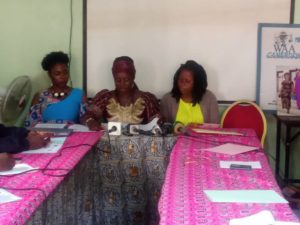The nongovernmental organization, Women in Alternative Action, WAA, Cameroon in partnership with the Global Partnership for the Prevention of Armed Conflict, GPPAC, have urged Cameroonians from all works of life to refrain from both violence and hate speech which incites violence that may lead to dreadful consequences. This was during a press conference Thursday, October 18, 2018 at WAA head office in Yaoundé.
Speaking at the press briefing, WAA Cameroon Executive Director, Justine Kwachu Kumche dwelled on the need for Cameroonians to eschew post electoral violence and for the need for dialogue and peaceful resolution of conflicts to take place.
The press conference organized as part of activities to mark the World Day of Conflict Resolution celebrated on the 3rd Thursday of October every year equally served as an opportunity for WAA Cameroon Executive Director and her partner GPPAC to strongly condemn any attempt to jeopardize the sacredness and sanctity of human life through any form of violence; reiterate the importance of averting the use of hate language to incite Cameroonians into violence and request all to resort to dialogue for a peaceful and progressive Cameroon; and to encourage political party leaders, especially the candidates of the October 7 presidential election to choose dialogue for the sake of sustainable peace.

In a statement delivered at the instance by a Consultant, Geraldine Ngobe, WAA stated emphatically that “the frequently used military and law enforcement suppression strategy to respond to political crisis has exacerbated frustrations and led to a violent response and an increase in hate speech on all sides.”
“The people of Cameroon are suffering, between the Anglophone crisis which has been deteriorating since 2016, the spillover of Boko Haram and the CAR conflict on our brothers, and the electoral violence in recent weeks, hundreds have been killed and an estimated quarter of a million people displaced. The events of 2008, 2011 and 2012 have shown that guns can replace ballot boxes if we do not take care. But further violence is not inevitable: there are many steps that can be to avert further loss of life, and that can bring our country to a future where peace, human security and justice prevail.”
The October 7 presidential election was cited as one which, for the first time in recent years, there has been serious pre-election declarations and threats by political parties.
Singling out Cameroon as the only country in the Tenth Parallel North of the Gulf of Guinea to have averted major ethnic, religious, sectarian or terrorism-related conflicts in the last decade, WAA Cameroon requested that “this remains the case” and that “it is not too late to turn the tide of violence that threatens our communities.”
And for this to be achieved, the NGO recommended to the Cameroon government, the implementation of strategic programes at all levels, from national down to polling stations to decrease electoral violence.
Among-st others, WAA emphasized election-related security and respect for civic and human rights with timely training and coordination of all security actors, and broader security planning.
It equally stipulated that polling station staff training must be more interactive, including role play activities, and scenario-building, in order to increase staff capacity to handle election day complaints effectively before they escalate to violence.
“The Electoral Code must be reviewed to permit inclusiveness and independence of the election regulatory organ. Strengthen the independence of ELECAM through ensuring that its members are elected by all members of political parties represented at the National Assembly, rather than being appointed by the Head of State. Review the code through establishing efficient and credible complaint processes: unresolved complaints are one of the main triggers for electoral violence – especially as they relate for instance to party registration – so the mechanisms to deal with them have to be efficient and trustworthy.”
WAA strongly encouraged the setting up of a neutral peace and reconciliation committee whose members are elected from political parties and civil society organisations to address grievances and promote reconciliation and healing.
To the international community including the UN, AU, ECCAS and the EU as well as members of the diaspora: seek to initiate and support dialogue processes among electoral stakeholders by creating among contesting parties, an agreement on the rules of the game and build up the commitment and relationships through exchange of information, regular meetings, contingency planning.
At the end, WAA Cameroon, together with her partner, the Global Partnership for the Prevention of Armed Conflict averred themselves to remain available to facilitate dialogue and engagement whenever the need arises.